Intro
Discover the potential 7 Methylprednisolone side effects, including steroid-induced issues like mood changes, insomnia, and weight gain, as well as adrenal suppression and increased blood sugar levels, to manage risks and benefits of corticosteroid treatment.
Methylprednisolone is a corticosteroid medication that is commonly used to treat a variety of conditions, including inflammation, allergic reactions, and immune system disorders. While it can be an effective treatment for many people, it can also cause a range of side effects, some of which can be serious. In this article, we will explore the potential side effects of methylprednisolone, including the most common and severe effects, as well as what you can do to minimize your risk of experiencing them.
Methylprednisolone is a synthetic corticosteroid that works by mimicking the effects of the hormone cortisol in the body. Cortisol is a natural hormone produced by the adrenal gland that plays a crucial role in regulating inflammation, immune response, and stress response. When taken as a medication, methylprednisolone can help to reduce inflammation and suppress the immune system, making it a useful treatment for conditions such as asthma, rheumatoid arthritis, and lupus. However, because it can affect the body's natural hormone balance, it can also cause a range of side effects.
The side effects of methylprednisolone can vary depending on the individual, the dose, and the duration of treatment. Some people may experience mild side effects that are temporary and resolve on their own, while others may experience more severe effects that require medical attention. It is essential to be aware of the potential side effects of methylprednisolone and to discuss any concerns with your doctor before starting treatment.
Methylprednisolone Side Effects Overview
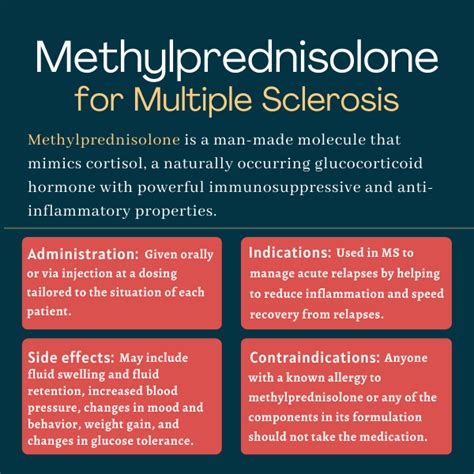
Common side effects of methylprednisolone include weight gain, mood changes, insomnia, and increased appetite. These effects are usually mild and temporary, but they can be uncomfortable and affect daily life. More severe side effects can include osteoporosis, cataracts, and glaucoma, which can be permanent and require ongoing medical treatment. In rare cases, methylprednisolone can cause life-threatening side effects, such as allergic reactions, seizures, and heart problems.
Common Methylprednisolone Side Effects
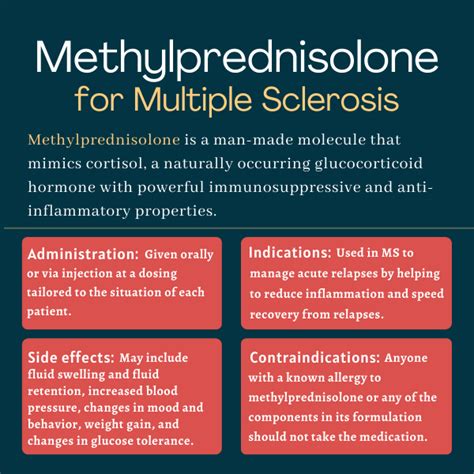
The most common side effects of methylprednisolone include:
- Weight gain: Methylprednisolone can cause an increase in appetite, leading to weight gain.
- Mood changes: Methylprednisolone can cause mood swings, anxiety, and depression.
- Insomnia: Methylprednisolone can disrupt sleep patterns, leading to insomnia.
- Increased appetite: Methylprednisolone can increase hunger and cravings for certain foods.
- Water retention: Methylprednisolone can cause fluid retention, leading to swelling in the face, hands, and feet.
- Acne: Methylprednisolone can cause acne and other skin problems.
- Hair loss: Methylprednisolone can cause hair loss, particularly on the scalp.
Less Common Methylprednisolone Side Effects
Less common side effects of methylprednisolone include: * Osteoporosis: Methylprednisolone can cause a loss of bone density, leading to osteoporosis. * Cataracts: Methylprednisolone can cause cataracts, a clouding of the lens in the eye. * Glaucoma: Methylprednisolone can cause glaucoma, a condition that can lead to blindness. * Increased blood sugar: Methylprednisolone can cause an increase in blood sugar levels. * Increased blood pressure: Methylprednisolone can cause an increase in blood pressure.Severe Methylprednisolone Side Effects
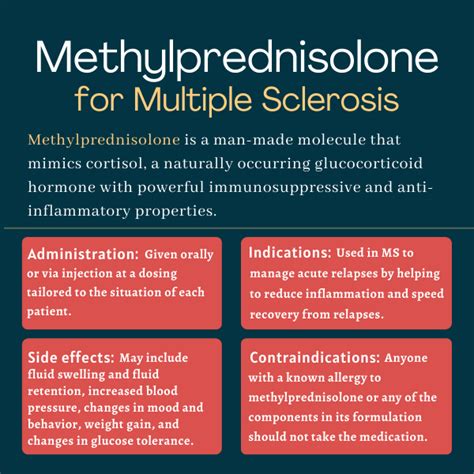
Severe side effects of methylprednisolone can include:
- Allergic reactions: Methylprednisolone can cause severe allergic reactions, including anaphylaxis.
- Seizures: Methylprednisolone can cause seizures, particularly in people with a history of seizure disorders.
- Heart problems: Methylprednisolone can cause heart problems, including heart failure and arrhythmias.
- Psychotic episodes: Methylprednisolone can cause psychotic episodes, including hallucinations and delusions.
- Adrenal insufficiency: Methylprednisolone can cause adrenal insufficiency, a condition in which the adrenal gland does not produce enough cortisol.
Methylprednisolone Side Effects in Children
Methylprednisolone can cause side effects in children, including: * Growth suppression: Methylprednisolone can suppress growth in children. * Delayed puberty: Methylprednisolone can cause delayed puberty in children. * Increased risk of infections: Methylprednisolone can increase the risk of infections in children.Methylprednisolone Interactions
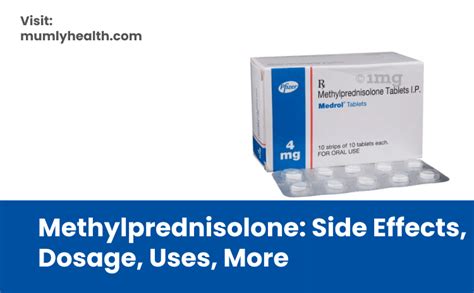
Methylprednisolone can interact with other medications, including:
- Blood thinners: Methylprednisolone can increase the risk of bleeding when taken with blood thinners.
- Diabetes medications: Methylprednisolone can increase blood sugar levels, which can affect diabetes medications.
- Blood pressure medications: Methylprednisolone can increase blood pressure, which can affect blood pressure medications.
- Seizure medications: Methylprednisolone can increase the risk of seizures when taken with seizure medications.
Methylprednisolone Dosage
The dosage of methylprednisolone will depend on the individual and the condition being treated. It is essential to follow the dosage instructions provided by your doctor and to not stop taking the medication without consulting your doctor first.Methylprednisolone Warnings
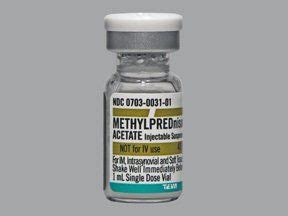
Methylprednisolone can cause serious side effects, including:
- Increased risk of infections: Methylprednisolone can increase the risk of infections, particularly in people with weakened immune systems.
- Osteoporosis: Methylprednisolone can cause osteoporosis, particularly in people who take the medication for extended periods.
- Cataracts: Methylprednisolone can cause cataracts, particularly in people who take the medication for extended periods.
- Glaucoma: Methylprednisolone can cause glaucoma, particularly in people who take the medication for extended periods.
Methylprednisolone and Pregnancy
Methylprednisolone can be used during pregnancy, but it is essential to consult with your doctor before taking the medication. Methylprednisolone can cause side effects in the fetus, including growth restriction and birth defects.Methylprednisolone and Breastfeeding
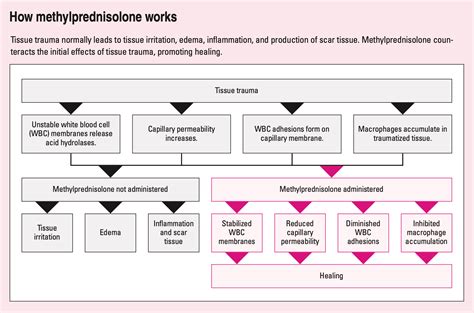
Methylprednisolone can pass into breast milk, and it is essential to consult with your doctor before breastfeeding while taking the medication. Methylprednisolone can cause side effects in the baby, including growth restriction and developmental delays.
Methylprednisolone and Geriatric Use
Methylprednisolone can be used in older adults, but it is essential to consult with your doctor before taking the medication. Methylprednisolone can cause side effects in older adults, including osteoporosis, cataracts, and glaucoma.Methylprednisolone Overdose
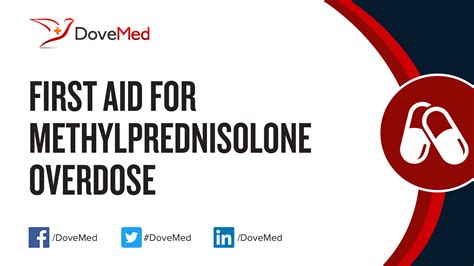
Methylprednisolone overdose can cause serious side effects, including:
- Seizures
- Coma
- Respiratory failure
- Cardiac arrest
If you suspect an overdose, it is essential to seek medical attention immediately.
Methylprednisolone Missed Dose
If you miss a dose of methylprednisolone, it is essential to take the missed dose as soon as possible. However, if it is almost time for the next dose, skip the missed dose and continue with the regular dosing schedule.Methylprednisolone Storage
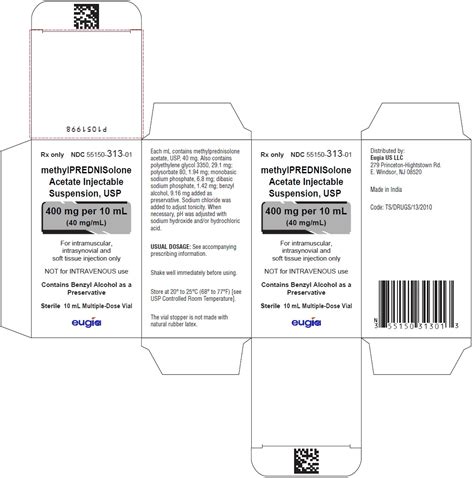
Methylprednisolone should be stored at room temperature, away from light and moisture. It is essential to keep the medication out of reach of children and pets.
Methylprednisolone Disposal
Methylprednisolone should be disposed of properly, and it is essential to follow the instructions provided by your doctor or pharmacist.What is methylprednisolone used for?
+Methylprednisolone is used to treat a variety of conditions, including inflammation, allergic reactions, and immune system disorders.
What are the common side effects of methylprednisolone?
+The common side effects of methylprednisolone include weight gain, mood changes, insomnia, and increased appetite.
Can methylprednisolone cause serious side effects?
+Yes, methylprednisolone can cause serious side effects, including allergic reactions, seizures, and heart problems.
How long does it take for methylprednisolone to start working?
+The time it takes for methylprednisolone to start working can vary depending on the individual and the condition being treated.
Can I stop taking methylprednisolone without consulting my doctor?
+No, it is essential to consult with your doctor before stopping methylprednisolone, as this can cause serious side effects.
In conclusion, methylprednisolone is a corticosteroid medication that can cause a range of side effects, from mild to severe. It is essential to be aware of the potential side effects and to discuss any concerns with your doctor before starting treatment. By understanding the benefits and risks of methylprednisolone, you can make informed decisions about your health and work with your doctor to minimize your risk of experiencing side effects. If you have any questions or concerns about methylprednisolone, we encourage you to comment below or share this article with others who may be interested.
